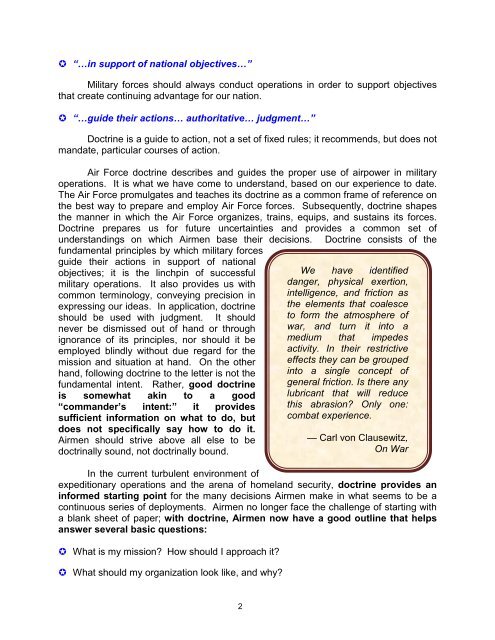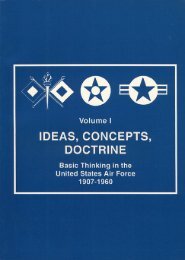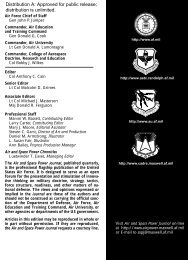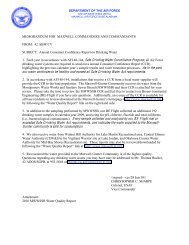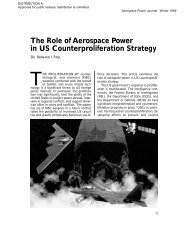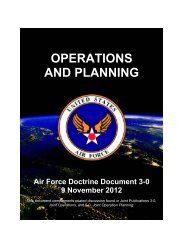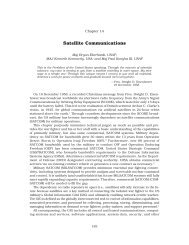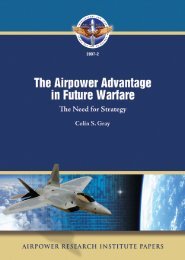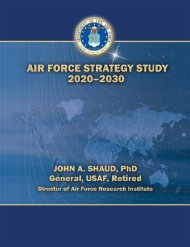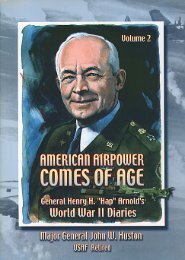Command
AFDD 1 - GlobalSecurity.org
AFDD 1 - GlobalSecurity.org
Create successful ePaper yourself
Turn your PDF publications into a flip-book with our unique Google optimized e-Paper software.
“…in support of national objectives…”<br />
Military forces should always conduct operations in order to support objectives<br />
that create continuing advantage for our nation.<br />
“…guide their actions… authoritative… judgment…”<br />
Doctrine is a guide to action, not a set of fixed rules; it recommends, but does not<br />
mandate, particular courses of action.<br />
Air Force doctrine describes and guides the proper use of airpower in military<br />
operations. It is what we have come to understand, based on our experience to date.<br />
The Air Force promulgates and teaches its doctrine as a common frame of reference on<br />
the best way to prepare and employ Air Force forces. Subsequently, doctrine shapes<br />
the manner in which the Air Force organizes, trains, equips, and sustains its forces.<br />
Doctrine prepares us for future uncertainties and provides a common set of<br />
understandings on which Airmen base their decisions. Doctrine consists of the<br />
fundamental principles by which military forces<br />
guide their actions in support of national<br />
objectives; it is the linchpin of successful<br />
military operations. It also provides us with<br />
common terminology, conveying precision in<br />
expressing our ideas. In application, doctrine<br />
should be used with judgment. It should<br />
never be dismissed out of hand or through<br />
ignorance of its principles, nor should it be<br />
employed blindly without due regard for the<br />
mission and situation at hand. On the other<br />
hand, following doctrine to the letter is not the<br />
fundamental intent. Rather, good doctrine<br />
is somewhat akin to a good<br />
“commander’s intent:” it provides<br />
sufficient information on what to do, but<br />
does not specifically say how to do it.<br />
Airmen should strive above all else to be<br />
doctrinally sound, not doctrinally bound.<br />
We have identified<br />
danger, physical exertion,<br />
intelligence, and friction as<br />
the elements that coalesce<br />
to form the atmosphere of<br />
war, and turn it into a<br />
medium that impedes<br />
activity. In their restrictive<br />
effects they can be grouped<br />
into a single concept of<br />
general friction. Is there any<br />
lubricant that will reduce<br />
this abrasion? Only one:<br />
combat experience.<br />
— Carl von Clausewitz,<br />
On War<br />
In the current turbulent environment of<br />
expeditionary operations and the arena of homeland security, doctrine provides an<br />
informed starting point for the many decisions Airmen make in what seems to be a<br />
continuous series of deployments. Airmen no longer face the challenge of starting with<br />
a blank sheet of paper; with doctrine, Airmen now have a good outline that helps<br />
answer several basic questions:<br />
What is my mission? How should I approach it?<br />
What should my organization look like, and why?<br />
2


